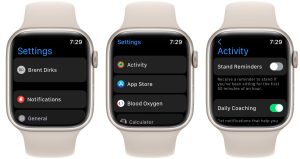US Court Rules Against Apple, Bans Its Newest Smartwatches Meet the Author Hello, I’m Fred Wilson, a blog writer and a tech enthusiast. I have been following the latest developments in the field of wearable technology for years, and I have a keen interest in the legal and technical aspects of the patent disputes that
US Court Rules Against Apple, Bans Its Newest Smartwatches
Meet the Author
Hello, I’m Fred Wilson, a blog writer and a tech enthusiast. I have been following the latest developments in the field of wearable technology for years, and I have a keen interest in the legal and technical aspects of the patent disputes that often arise in this domain. In this article, I will share with you the details of the recent US court ruling that banned Apple’s newest smartwatches, and what this means for the future of the industry.
What is the Patent Dispute About?
The patent dispute that led to the ban of Apple’s smartwatches dates back to 2013, when Apple allegedly approached Masimo, a medical tech firm that created a sensory device that measures blood oxygen levels, for a potential partnership. Masimo claims that Apple ended up poaching some of its workers and tech, and used them to develop the pulse oximeter feature that debuted in the Apple Watch Series 6 in 2020.
Masimo sued Apple for patent infringement in 2020, and also filed a complaint with the US International Trade Commission (ITC), seeking to block the import and sale of Apple’s smartwatches in the US. Masimo argued that Apple’s smartwatches infringed on two of its patents related to how the watches calculate a person’s blood oxygen saturation.
How Did the Court Reach Its Decision?
The ITC is an independent federal agency that has the authority to issue exclusion orders that prevent the importation of products that infringe on US patents. The ITC’s investigation of the patent dispute between Apple and Masimo began in April 2021, and concluded in October 2021, when the ITC upheld its initial ruling that Apple violated Masimo’s patents and issued a limited exclusion order (LEO) that banned the import and sale of Apple’s smartwatches that have the pulse oximeter feature. This includes the Apple Watch Series 9 and Apple Watch Ultra 2, which were released in September 2021.
The ITC’s ruling was based on the evidence and arguments presented by both sides, as well as the opinions of expert witnesses and administrative law judges. The ITC found that Apple’s smartwatches use a similar method and algorithm as Masimo’s device to measure blood oxygen levels, and that Apple failed to prove that its smartwatches work differently or that Masimo’s patents are invalid.

Image by:https://www.makeuseof.com/
What are the Implications of the Ban for Apple and Consumers?
The ban of Apple’s smartwatches in the US is a significant blow for Apple, as the US is one of its largest and most profitable markets. According to a report by Counterpoint Research, Apple had a 28% share of the global smartwatch market in the third quarter of 2021, and a 35% share of the US market. The ban could cost Apple billions of dollars in lost revenue and damage its reputation as a leader in wearable technology.
The ban also affects consumers who are interested in buying or using Apple’s smartwatches, especially those who value the health and fitness features that the pulse oximeter provides. The pulse oximeter is a useful tool that can help users monitor their blood oxygen levels, which can indicate various health conditions, such as COVID-19, sleep apnea, asthma, and heart problems. The ban prevents consumers from accessing this feature, and limits their choices of smartwatches in the market.
How is Apple Responding to the Ruling?
Apple strongly disagrees with the ITC’s ruling, and is pursuing a range of legal and technical options to ensure that its smartwatches are available to customers in the US. Apple has appealed the ITC’s ruling to the US Court of Appeals for the Federal Circuit, which is the highest court that reviews patent cases. Apple hopes to overturn the ITC’s ruling, or at least delay its enforcement, until the appeal is resolved.
Apple is also seeking a presidential veto of the ITC’s ruling, which is possible under the law. The ITC’s ruling is subject to a 60-day presidential review period, which ends on December 25, 2021. During this period, President Biden can decide to disapprove the ITC’s ruling, based on public interest or policy considerations. However, this is a rare occurrence, as only five presidential vetoes have been issued in the history of the ITC.
In addition, Apple is exploring technical alternatives to avoid infringing on Masimo’s patents, such as modifying the software or hardware of its smartwatches, or removing the pulse oximeter feature altogether. However, these options may take time and resources to implement, and may affect the performance and functionality of the smartwatches.

















Leave a Comment
Your email address will not be published. Required fields are marked with *